BMW X3 VS VW Tayron
In the competitive landscape of compact SUVs, the BMW X3 stands out with its dynamic handling and luxurious interior, offering drivers a blend of performance and comfort. In contrast, the VW Tayron impresses with its practicality and spaciousness, making it an appealing choice for families seeking functionality without sacrificing style. Ultimately, while the X3 caters to those looking for a sporty drive, the Tayron excels in delivering everyday usability.
BMW X3
The BMW X3 stands out in the competitive SUV market with its refined blend of performance and luxury. Its interior boasts high-quality materials and a design focused on driver comfort and convenience. With a robust engine lineup, the vehicle offers a balanced driving experience that caters to both urban settings and off-road adventures.
detailsVW Tayron
The Tayron stands out as a stylish and versatile SUV that expertly blends form and function. With its spacious interior and modern design, it caters to families and adventure seekers alike, making every journey enjoyable. Equipped with advanced technology and safety features, the Tayron promises a driving experience that is both secure and exhilarating.
detailsIn the increasingly competitive SUV market, the BMW X3 and Volkswagen Tayron represent two compelling choices for drivers seeking performance, innovation, and practicality. This article delves into the technical aspects, innovations, and overall appeal of these two popular models, providing a comprehensive comparison for discerning buyers.
Engine Options and Performance
The BMW X3 boasts a more diverse lineup of engine options, including Diesel MHEV, Petrol MHEV, Plugin Hybrid, and traditional Petrol engines. The power output ranges from 184 HP to a staggering 510 HP in the high-performance variants. With an impressive acceleration ranging from 4.6 seconds to 7.9 seconds for 0-100 km/h, it delivers a thrilling driving experience. Coupled with an all-wheel-drive system and automatic transmission, the X3 promises not only sporty handling but also enhanced road grip and stability.
On the other hand, the Volkswagen Tayron offers a robust selection of petrol and diesel engines with outputs varying from 150 HP to 272 HP. While the Tayron may not match the X3 in sheer horsepower, its acceleration from 0-100 km/h can be as quick as 7.3 seconds, highlighting its capable performance. The Tayron is available in both front-wheel and all-wheel drive configurations, offering flexibility depending on driving conditions.
Fuel Efficiency and Emissions
From a fuel consumption standpoint, the BMW X3 presents an efficient option with various models averaging between 2.1 L/100 km and 10.8 L/100 km, reflecting its range of engine types, particularly the hybrid variants. With CO2 emissions as low as 21 g/km in the plugin hybrid versions, it positions itself as a responsible choice for the environmentally-conscious driver.
The Volkswagen Tayron, while slightly less efficient with a consumption rate that can go up to 6.4 L/100 km, compensates with its advanced petrol MHEV technology. Its CO2 emissions range around 9 g/km for hybrid models, making it an attractive option for those who prioritize lower emissions in urban settings.
Interior Comfort and Technology
In terms of cabin space and comfort, both models offer spacious interiors that comfortably seat five passengers. The BMW X3 slightly edges out in trunk capacity, providing between 450 L and 570 L for varied load needs. The Tayron, however, shines in this area with a trunk capacity of up to 885 L, making it a practical choice for families and those needing extra cargo space.
Technologically, the BMW X3 is equipped with cutting-edge infotainment systems, featuring a large touchscreen display, advanced connectivity options, and driver assistance technologies that enhance safety and convenience on the road. The integration of features like smart navigation, adaptive cruise control, and AI-enhanced safety systems showcases BMW's commitment to safety and technological innovation.
Conversely, the Volkswagen Tayron is not to be underestimated, offering a similarly advanced infotainment suite that includes a digital cockpit, smartphone integration, and various driver aids. Its modern aesthetics and functionality make for a user-friendly experience, ensuring that drivers and passengers alike enjoy their journey.
Pricing and Value Proposition
When it comes to pricing, the BMW X3 typically commands a premium due to its brand reputation, luxury features, and performance pedigree. Buyers may expect to pay a premium for the well-rounded package it offers, including strong performance, advanced technology, and a polished interior.
In contrast, the Volkswagen Tayron offers a more budget-friendly option, appealing to those looking for a rugged yet stylish SUV experience without breaking the bank. While it may lack some of the high-performance variants of the X3, it provides excellent value with its spaciousness and solid technology offerings.
The Final Verdict
Both the BMW X3 and Volkswagen Tayron have their strengths catering to different needs in the SUV market. The X3 excels with its performance, luxurious features, and hybrid technology, making it a prime choice for those who prioritize driving experience and brand prestige. The Tayron, meanwhile, provides exceptional value, practicality, and the promise of modern tech, appealing to families and everyday drivers alike.
Ultimately, the decision between the two comes down to personal preferences, lifestyle requirements, and budget considerations. Whether you choose the spirited X3 or the versatile Tayron, both vehicles promise to deliver an enjoyable driving experience on and off the road.
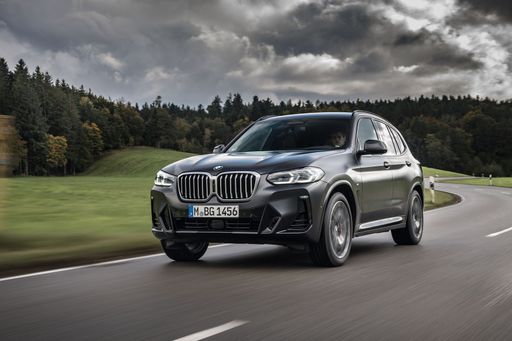 @ press.bmwgroup.com
@ press.bmwgroup.com
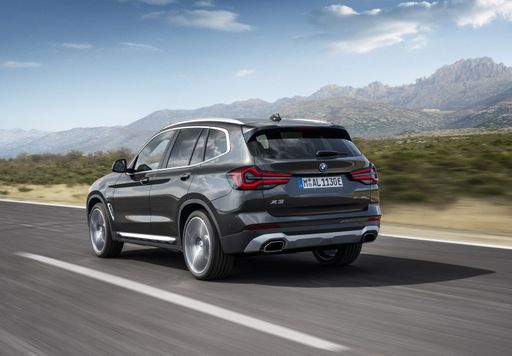 @ press.bmwgroup.com
@ press.bmwgroup.com
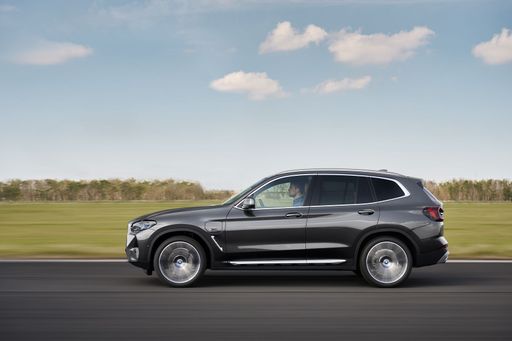 @ press.bmwgroup.com
@ press.bmwgroup.com
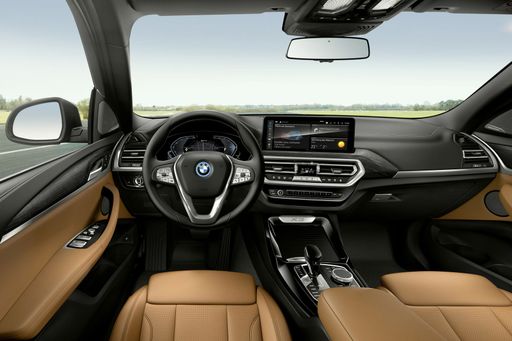 @ press.bmwgroup.com
@ press.bmwgroup.com
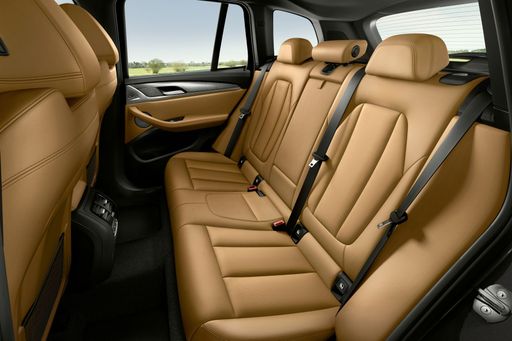 @ press.bmwgroup.com
@ press.bmwgroup.com
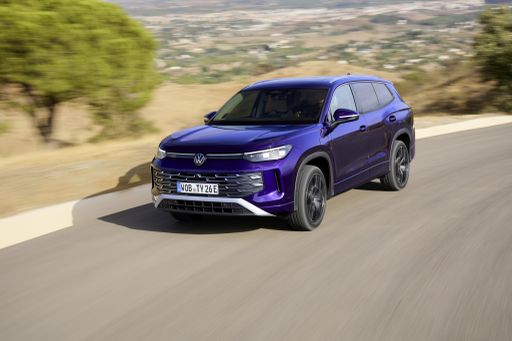 @ volkswagen-newsroom.com
@ volkswagen-newsroom.com
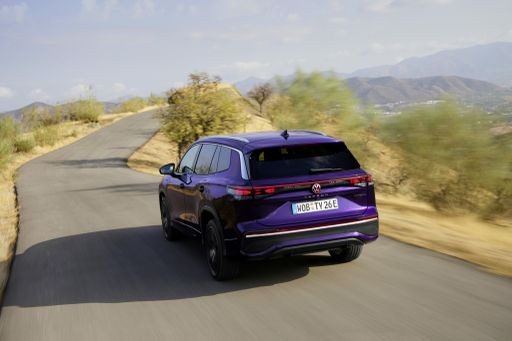 @ volkswagen-newsroom.com
@ volkswagen-newsroom.com
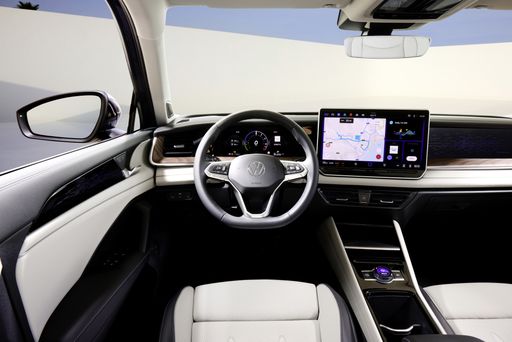 @ volkswagen-newsroom.com
@ volkswagen-newsroom.com
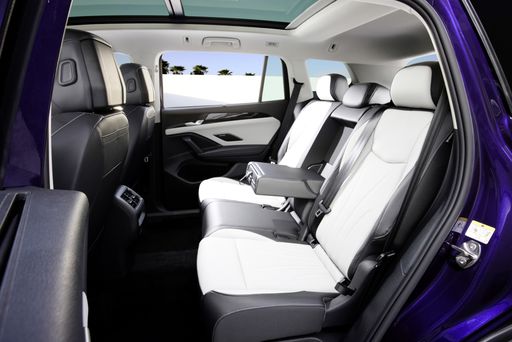 @ volkswagen-newsroom.com
@ volkswagen-newsroom.com

|

|
|
|
|
Costs and Consumption |
|
|---|---|
|
Price
about 51700 - 97300
$
|
Price
about 42000 - 56700
$
|
|
Consumption L/100km
0.9 - 10.8
L
|
Consumption L/100km
0.4 - 6.4
L
|
|
Consumption kWh/100km
-
|
Consumption kWh/100km
-
|
|
Electric Range
44 - 90
km
|
Electric Range
117 - 126
km
|
|
Battery Capacity
11.2 - 19.7
kWh
|
Battery Capacity
19.7
kWh
|
|
co2
21 - 246
g/km
|
co2
9 - 167
g/km
|
|
Fuel tank capacity
50 - 68
L
|
Fuel tank capacity
45 - 58
L
|
Dimensions and Body |
|
|
Body Type
SUV
|
Body Type
SUV
|
|
Seats
5
|
Seats
5
|
|
Doors
5
|
Doors
5
|
|
Curb weight
1875 - 2140
kg
|
Curb weight
1682 - 1948
kg
|
|
Trunk capacity
450 - 570
L
|
Trunk capacity
705 - 885
L
|
|
Length
4708 - 4755
mm
|
Length
4792
mm
|
|
Width
1891 - 1920
mm
|
Width
1853 - 1866
mm
|
|
Height
1660 - 1676
mm
|
Height
1666 - 1668
mm
|
|
Payload
415 - 585
kg
|
Payload
528 - 566
kg
|
Engine and Performance |
|
|
Engine Type
Diesel MHEV, Petrol MHEV, Plugin Hybrid, Petrol
|
Engine Type
Petrol MHEV, Plugin Hybrid, Diesel
|
|
Transmission
Automatic
|
Transmission
Automatic
|
|
Transmission Detail
Automatic Gearbox
|
Transmission Detail
Automat. Schaltgetriebe (Doppelkupplung)
|
|
Drive Type
All-Wheel Drive
|
Drive Type
Front-Wheel Drive, All-Wheel Drive
|
|
Power HP
184 - 510
HP
|
Power HP
150 - 272
HP
|
|
Acceleration 0-100km/h
3.8 - 8.4
s
|
Acceleration 0-100km/h
7.3 - 9.4
s
|
|
Max Speed
210 - 250
km/h
|
Max Speed
204 - 221
km/h
|
|
Torque
300 - 700
Nm
|
Torque
250 - 400
Nm
|
|
Number of Cylinders
4 - 6
|
Number of Cylinders
4
|
|
Power kW
135 - 375
kW
|
Power kW
110 - 200
kW
|
|
Engine capacity
1995 - 2998
cm3
|
Engine capacity
1498 - 1968
cm3
|
|
Top speed
210 - 250
km/h
|
Top speed
204 - 221
km/h
|
General |
|
|
Model Year
2023 - 2024
|
Model Year
2025
|
|
CO2 Efficiency Class
F, B, G, E
|
CO2 Efficiency Class
E, B, F
|
|
Brand
BMW
|
Brand
VW
|
BMW X3
Introducing the BMW X3: A Blend of Power and Innovation
The BMW X3 is a testament to the brand’s commitment to merging luxury with cutting-edge technology. This SUV not only offers impressive on-road performance but also showcases innovative features that cater to both petrolheads and eco-conscious drivers.
Powerful Performance Across the Range
The BMW X3 comes with various powertrain options to suit diverse driving preferences, ranging from efficient plug-in hybrids to powerful petrol and diesel mild-hybrids. With performance outputs ranging from 184 PS to an impressive 510 PS, the X3 proves its versatility on the road. Paired with BMW's renowned automatic transmission, each model offers a smooth and responsive driving experience complemented by the brand's xDrive all-wheel-drive system.
Leading-Edge Hybrid Technology
Among the X3's portfolio, the plug-in hybrid variants stand out with their optimal balance between efficiency and performance. These models boast electric-only ranges up to 90 km, ideal for urban driving with minimal emissions. Meanwhile, the mild-hybrid systems enhance efficiency by recuperating energy during deceleration and supporting the combustion engine, optimizing fuel consumption ranging from 0.9 L/100km to 10.8 L/100km depending on the model.
Contemporary Design with Practical Features
From a design perspective, the BMW X3 maintains its iconic SUV silhouette, characterized by robust proportions and sleek, aerodynamic lines. With dimensions of up to 4755 mm in length and a luggage capacity of up to 570 litres, it caters to both style enthusiasts and practical users. Additionally, the interior showcases BMW’s commitment to sophistication, featuring high-quality materials, state-of-the-art infotainment systems, and comprehensive driver-assistance technologies.
Efficiency Meets Performance
The X3's impressive performance figures are complemented by its responsible approach to CO2 emissions, aligning with EU efficiency standards. Enhanced by its comprehensive suite of driver aids and intelligent safety features, the X3 ensures both the thrill of driving and peace of mind.
Conclusion: The Ultimate Driving Companion
In essence, the BMW X3 represents the perfect intersection of dynamic performance, fuel efficiency, and modern-day technology. With options catering to diverse needs and preferences, it remains a leading choice for drivers seeking versatility, innovation, and luxury.
VW Tayron
Introducing the VW Tayron: Where Innovation Meets Performance
The VW Tayron is making waves in the SUV market with its cutting-edge technology, impressive performance specifications, and versatile engine options, catering to a diverse range of drivers. As a compact SUV, the Tayron perfectly balances functionality and style, making it an attractive choice for both urban and adventurous lifestyles. Let's dive into the technical aspects and innovations that set the Tayron apart.
Engine Options and Performance
The Tayron is available in several configurations, each engineered to deliver a thrilling driving experience. Among the most notable is the 1.5 eTSI OPF Petrol MHEV engine, boasting an output of 150 horsepower. This variant showcases a superb balance between power and efficiency, achieving an impressive fuel consumption of just 6.2 liters per 100 kilometers.
Additionally, the Tayron offers hybrid options, such as the 1.5 eHybrid OPF Plugin Hybrid. This model can produce up to 204 horsepower, with an electric range of 126 kilometers, allowing drivers to experience the benefits of electric motoring without sacrificing performance. For those who prefer diesel, the 2.0 TDI SCR Diesel engine delivers a robust 193 horsepower, paired with either front-wheel or all-wheel drive configurations. This versatility ensures that there's a suitable option for every type of driver.
Cutting-Edge Technology and Features
The Tayron is equipped with an array of advanced technologies designed to enhance comfort, safety, and connectivity. Its automatic transmission features a dual-clutch system, providing smooth gear shifts and optimal power delivery. The vehicle's driving dynamics are further improved by the availability of Dynamic Chassis Control, allowing drivers to select their preferred driving mode for any given scenario.
Inside, the Tayron boasts a spacious cabin with ample seating for five, complemented by modern design elements and high-quality materials. The trunk capacity reaches up to 885 liters, making it ideal for family outings or long road trips. Furthermore, the integration of the latest infotainment system ensures that drivers remain connected on the go, offering seamless smartphone compatibility through Apple CarPlay and Android Auto.
Safety Comes First
Safety is paramount in the Tayron's design. Equipped with state-of-the-art driver assistance systems, the SUV helps prevent accidents and enhances overall road safety. Features such as adaptive cruise control, blind-spot monitoring, and lane-keeping assist are just some of the innovative safety elements offered in the Tayron. With its comprehensive safety suite, the Tayron provides peace of mind for both drivers and passengers alike.
A Sustainable Future with the Tayron
As environmental awareness continues to grow, the VW Tayron contributes to a more sustainable future through its hybrid variants that feature lower emissions. For instance, the 1.5 eHybrid OPF Plugin Hybrid achieves a CO2 efficiency class of B, demonstrating VW’s commitment to eco-friendly mobility without compromising performance. This shift toward sustainability is becoming increasingly significant for consumers looking for responsible yet fun driving experiences.
Conclusion: The VW Tayron Stands Out
The VW Tayron is a remarkable SUV that encapsulates the perfect blend of performance, technology, and sustainability. With its diverse range of engine options, advanced features, and focus on safety, it is tailored to meet the needs of modern drivers. Whether you opt for the petrol, diesel, or hybrid model, the Tayron is sure to impress with its dynamic capabilities and stylish design, solidifying its place in the competitive automotive landscape.
